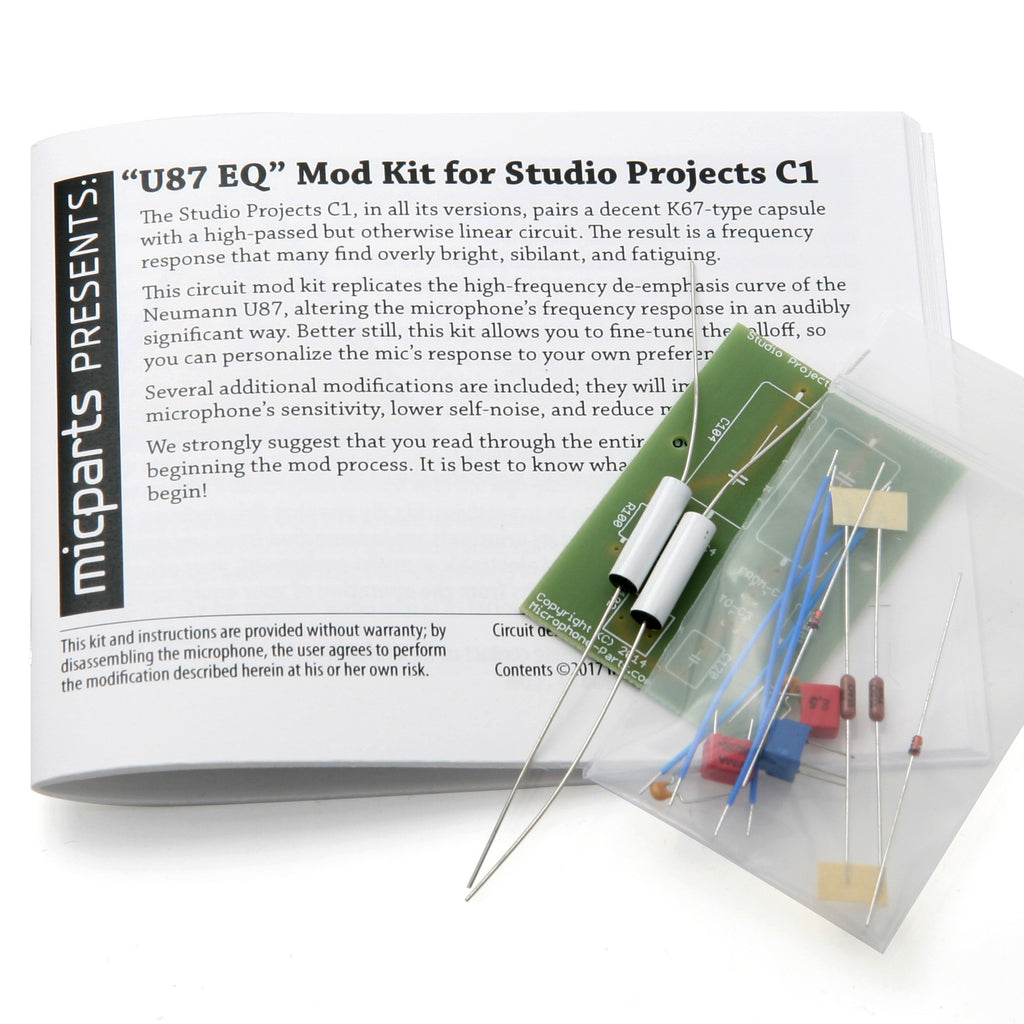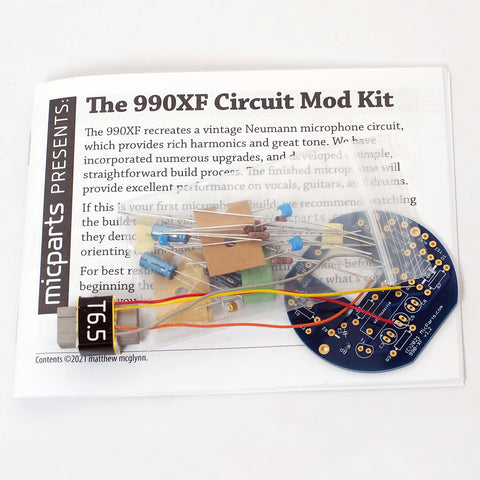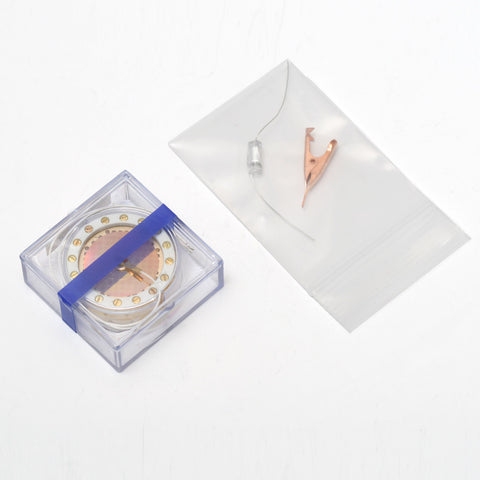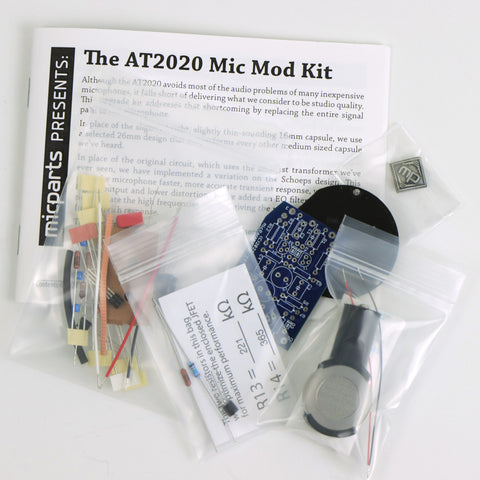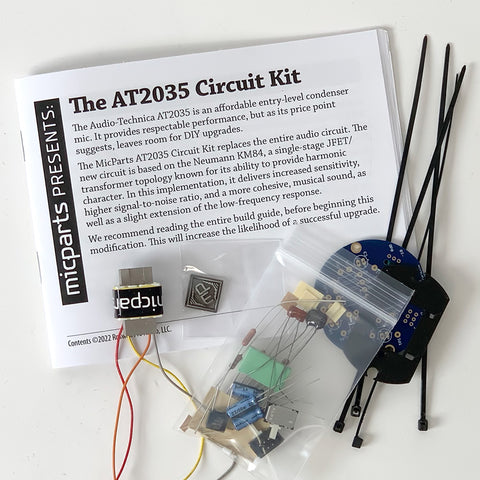Studio Projects C1 Circuit Upgrade Kit
$ 79.00
This circuit mod kit will give your Studio Projects C1 the same frequency response curve as a $3300 Neumann U87 -- although with fuller bass! Better still, the high-frequency response of the circuit is adjustable, so you can dial in as much filtering/attenuation as you like.
This DIY electronics kit requires soldering (and desoldering). If you lack the patience, time, tools, or confidence to modify your microphone, see the "C1 Mod Service" section at the bottom of this page.
Because this mic upgrade requires de-soldering components from a Chinese-sourced PCB, we recommend using solder wick rather than a vacuum pump. We sell small spools of solder wick.
Features & Benefits
- Makes your C1 sound very close to a U87...
- ...but with better low-frequency response.
- Reduce microphonics.
- Raise output level and sensitivity.
- Reduce self-noise.
- Save the cost of a new capsule!
Recent Customer Feedback
I know you must hear this all the time, but I am speechless. It is full, warm, un-hyped and crazy silky smooth.
- Michael M.I did a comparison between the Studio Projects C1 that I modded with your kit against a Neumann U87 AI. It is clear which is the better sounding microphone and it isn’t the Neumann. There is so much more bottom end and warmth in the midrange.
I’m a professional producer engineer based in the UK. I need to have a U87; it is expected for me to have one. But I will preferentially use the C1 in most situations.
-James R.
See more customer reviews at the bottom of this page.
About the C1
The Studio Projects C1 has always had a good reputation, for good reason. It has a very nice capsule, is solidly built, and uses generally decent components.
But it has a problem, one that is ironically shared by so many imported condensers: it is too brightly voiced. It uses a linear* transformerless circuit (based on the Schoeps design), and a K67 capsule that expects corrective EQ in the circuitry. The resulting mic can sound nice on certain sources, if you need to capture a lot of high frequency information to help a source cut through a mix.
But on too many sources, the C1 is just too bright and peaky. The capsule has a boosted top end, which the circuit does not correct. The result is an over-bright and fatiguing sound. On solo acoustic guitar or voice, the mic becomes sharp and sibilant.
*(We use the term "linear" to indicate that the circuit does not provide high-frequency corrective EQ, such as the K67 capsule expects. But the C1 circuit is really only linear above 80Hz; it is rolled off in the low bass frequencies, even when the high-pass filter is disabled.)
We have come up with an adjustable EQ circuit to correct this fault. In fact, we've reproduced the EQ curve of the Neumann U87. The modified circuit will behave just like the U87, although with fuller low-frequency response.
The kit includes additional upgrades as well, which we've included to reduce microphonics, lower the mic's self-noise, and increase sensitivity.
Here is a frequency sweep showing the circuit's response. This is not an acoustic test of the microphone, but an electronic test of the circuit by itself. The stock circuit is rolled off in the low bass, but linear out beyond 20kHz. This is a poor match for the K67 capsule, which can be thin in the bass but hyped in the 8-12kHz range.

The green trace shows the modified circuit: flat in the lowest bass frequencies, but rolled off above 1kHz. This is exactly the sort of complementary EQ that the K67 capsule needs and expects. This is called "preemphasis/deemphasis;" the capsule pre-emphasizes high frequency information, and the circuit attenuates it. The Neumann U87 uses precisely this same approach, with the same HF rolloff seen here.
What's in the box?
The new EQ circuit is housed on a US-made, custom PCB. You'll also get a pair of significantly upgraded, US-made signal capacitors, plus a handful of other components.
You will not need to change the C1's capsule for this mod. It is a very nice K67 type.
(If you have already changed the capsule for our RK-87 or RK-12 types, you could still use this mod kit. If you have installed a K47 capsule, we do not recommend this mod kit, as the circuit mod would cause the microphone to be too dark-sounding.)
Audio Sample: U87 Ai comparison
We recorded a U87 Ai and a modded C1 side by side. The audio tracks are practically indistinguishable. Listen via the MP3 players embedded below.
Here's a frequency analysis of these two audio tracks. The response of the two mics is nearly identical above 80Hz. Below 80Hz, the modded C1 has better response. (If you don't want the lows, just switch on the mic's high-pass filter.)

Note: the graph above is not a sweep test of either microphone, but an averaged frequency response of the voice recordings included below. The point of the graph is that the U87 Ai and modded C1 capture almost exactly the same frequencies (above 80Hz).
Voiceover Demo / Testimonial
Audio Sample: Before and After
Customer Marco Primeau made a video to show the mod process. He includes before-and-after audio clips.
Listen for sibilance in the voice records that goes away in the "after" samples. Listen to how the pick-on-string sound is exaggerated in the "before" guitar samples, as compared to the more integrated sound in the "after" samples.
Audio Sample: Before and After (#2)
Customer Travis Hanna recorded a series of audio clips before, during, and after the mod. Hear the entire playlist here.
Voice - Before
Listen to the sharp "s" sounds. Even at low volumes, they stand apart from the track rather than being integrated into the rest of the voice.
Voice - After
After the mod, the mic hears voices more uniformly, without exaggerating high frequencies.
Guitar - Before
The guitar sounds good, but the attack is exaggerated. It would cut through a busy mix -- but that's only suitable for productions in which a strummed acoustic is intended to be the focus of the mix. In other situations, the mix engineer would be low-passing this track. Note too that compression would make this hyped top end sound awful.
Guitar - After
As in the Marco video, this clip demonstrates a much smoother, more integrated and homogenous sound, with more body.
Compatibility
As of March, 2017, this circuit mod kit is compatible with all known revisions of the Studio Projects C1:
- the earliest "797 Audio" branded microphones with no switches
- the upgraded "797 Audio" branded microphones with a 3-way pad/filter switch
- the later production "Studio Projects" branded ("red badge") microphones with separate pad and filter switches
The kit includes parts and instructions to modify all three versions of the C1.
If you have a C3, order that kit from our Studio Projects C3 Mod Kit page.
C1 Mod Service
We now offer a mod service for US residents. If you're not able to solder, or don't wish to risk damaging your microphone, we can perform this modification for you.
The mod service includes:
- Modification of your mic by an experienced professional technician
- 24-hr burn in and testing
- Return shipping (domestic US only)
- 30-day warranty
Read more about the C1/C3 Mod Service. (The mod service price includes the cost of the parts kit.)

